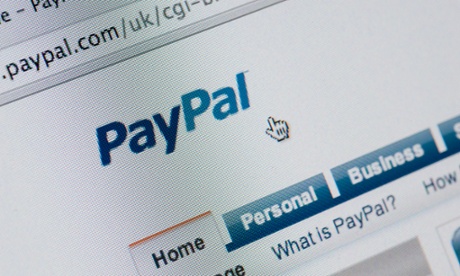
The WikiLeaks staffer and Snowden collaborator Sarah Harrison has criticised Pierre Omidyar, the eBay founder who is setting up a new journalism venture with Glenn Greenwald, Laura Poitras and Jeremy Scahill, for his involvement in the 2010 financial blockade against WikiLeaks.
In her first interview since leaving Moscow for Berlin last month, Harrison told German news weekly Stern: "How can you take something seriously when the person behind this platform went along with the financial boycott against WikiLeaks?"
Harrison was referring to the decision in December 2010 by PayPal, which is owned by eBay, to suspend WikiLeaks' donation account and freeze its assets after pressure from the US government. The company's boycott, combined with similar action taken by Visa and Mastercard, left WikiLeaks facing a funding crisis.
"His excuse is probably that there is nothing he could have done at the time," Harrison continued. "Well, he is on the board of directors. He can't shake off responsibility that easily. He didn't even comment on it. He could have said something like: 'we were forced to do this, but I am against it'."
Harrison joined WikiLeaks from the Bureau of Investigative Journalism, and worked with the organisation on the Afghan war logs and leaked cables projects. She now works on the WikiLeaks legal defence team, although she has no legal qualifications, and was catapulted to fame when she accompanied Edward Snowden, the NSA whistleblower, on his flight from Hong Kong to Russia in June 2013.
Referring to Omidyar's plans to set up a new media organisation, in which the former Guardian writer Greenwald – who wrote a number of stories from the Snowden revelations – will play a central part, Harrison said: "If you set up a new media organisation which claims to do everything for press freedom, but you are part of a blockade against another media organisation, then that's hard for us to take it seriously. But I hope that they stick to their promises".
Harrison also suggests that Omidyar could have carried the legal costs of the 14 Anonymous hacktivists who were sent to prison for attacking PayPal over the boycott. "That would have been a nice gesture".
Jail sentences for hacktivism
On Thursday, 11 of the so-called "PayPal 14" pleaded guilty in a court in California to one felony count of conspiracy and one misdemeanour count of damaging a computer. They stood accused of organising a "distributed denial-of-service" (DDoS) attack, knocking PayPal's servers offline by overloading them with traffic in 2010, causing what the company estimated to be $5.5m of damage.
Two of the remaining defendants did not take the plea bargain offered, and pleaded guilty only to the misdemeanour charge, meaning they will be required to serve a 90-day jail term. The final defendant, Dennis Collins, did not attend the hearing as he was in Virginia facing similar charges over attacks on other websites at the same time.
In January, four British members of Anonymous were sentenced for the same campaign. Chris Weatherhead was given an 18-month sentence, Ashley Rhodes was handed a seven-month jail sentence, Peter Gibson was given a six month suspended sentence, and 18-year-old Jake Burchall was given an 18 month youth rehabilitation order.
"Vastly different"
Omidyar, however, argues that the tools used in a DDoS attack render them "vastly different than other forms of protest".
"The problem in this case," he wrote on the Huffington Post website on 3 December, "is that the tools being distributed by Anonymous are extremely powerful. They turn over control of a protester's computer to a central controller which can order it to make many hundreds of web page requests per second to a target website.
"It's like each protester can bring along 6,000 phantom friends without going to the trouble of convincing each of them to take an afternoon off and join the protest in the street."
But the eBay founder said that the law was too hard on the 14 defendants in the case. "It would be unjust to hold fourteen people accountable for the actions of a thousand… Each person should be accountable for the damage they personally caused.
"Second, the law allows prosecutors to calculate damage in a way that seems overstated. An appropriate damage estimate includes the pay and overtime pay required for employees to respond to the attack.
"But the damage estimate apparently being used by prosecutors in this case includes the cost of upgrading equipment to better defend against similar future attacks. To me, that doesn't make sense."
In the Stern interview, Harrison, who is British, also stated that she had chosen to move to Berlin because her lawyers had advised her that anti-terror laws had made it unsafe for her to travel back to the UK.
"Any activity which endangers the public order or could change the government's course of action can be interpreted as terrorism. The fight for women's right to vote, and the political protests that came with it, would under the current interpretation of the law be seen as terrorism. The rule of law is effectively disabled, and I believe that many people who are politically active feel unsafe in such an environment, not just me."
In Berlin, on the other hand, Harrison said she had a good network of friends and was able to continue working for WikiLeaks. "The German public is very well disposed towards Edward Snowden and what he has done. Personally and legally, I consider the risk I am under here as low."
• This article was amended on 6 December 2013 to correct the number of British members of Anonymous who were sentenced in January, and to correct the date of the decision by PayPal to suspend WikiLeaks' donation account.

